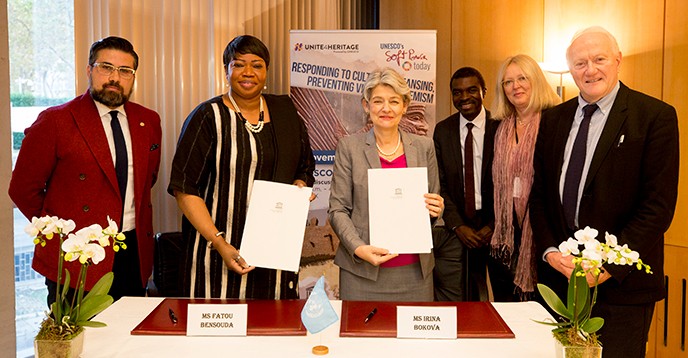Recognizing the importance of protecting
cultural heritage from attack in times of conflict, Irina Bokova,
Director-General of UNESCO, and Fatou Bensouda, Prosecutor of the International
Criminal Court (ICC), today signed a Letter of Intent formalizing and further
enhancing their collaboration.
The signing of the Letter of Intent took
place in the margins of an international high-level panel on “Responding to
Cultural Cleansing, Preventing Violent Extremism” at UNESCO Headquarters, in
which both Ms Bokova and Prosecutor Bensouda participated.
"The deliberate destruction of cultural heritage not only affects
peoples’ historical identity but fuels sectarian violence and hampers
post-conflict recovery and peacebuilding. UNESCO and the ICC must strengthen
their cooperation for the protection of cultural property in armed conflicts,
as this is a humanitarian and security imperative”, said Ms Bokova.
Praising UNESCO for its crucial work,
Prosecutor Bensouda emphasized that more can be done, adding that “an effective
strategy to address the destruction of cultural heritage requires a
multi-faceted and collaborative approach.
UNESCO is a natural partner for my Office and, the ICC more broadly, in
confronting the scourge of attacks against cultural heritage within the Rome
Statute framework. This Letter of Intent is a recognition of that important
relationship and paves the way for continued cooperation.” She added: “cultural
heritage is the embodiment of the continuity of the human story, a celebration
of our commonality and the richness of our diversity. We all have a duty to protect cultural
heritage. With close collaboration with UNESCO, we hope to make a difference.”
The recent historic ruling of the ICC (link
is external) in the case of the destruction of shrines and mausoleums in
Timbuktu (Mali), the first of its kind before the Court, sent a clear signal
that intentional targeting of cultural heritage is a serious crime that causes
significant suffering to those immediately affected and beyond, and should not
go unpunished. The Court subsequently issued aReparation Order (link is
external), establishing that the victims of such crimes were entitled to
compensation.
The importance of prosecuting those
responsible for war crimes against cultural heritage was echoed in the
ground-breaking UN Security Council Resolution 2347 (link is external), adopted
in March 2017, the first ever to condemn the unlawful destruction of cultural
heritage. These unprecedented
developments have led over the past years to frequent exchanges and
collaboration between UNESCO and the ICC Office of the Prosecutor, based on the
convergence of aims within their respective independent mandates.
As attacks against culture have regrettably
become more frequent, the need for a stronger and more articulated framework of
cooperation has become apparent. In
addition to expertise UNESCO has provided in the context of the Al Mahdi case,
cooperation has also been at the non-operational level, for example through participation
in the ICC Office of the Prosecutor’s new policy initiative on cultural
heritage, which is scheduled for finalization and adoption in 2018. The Letter of Intent signed today builds on
these efforts, further solidifying the existing relationship, with a view to
establishing a comprehensive cooperation agreement in the near future.

